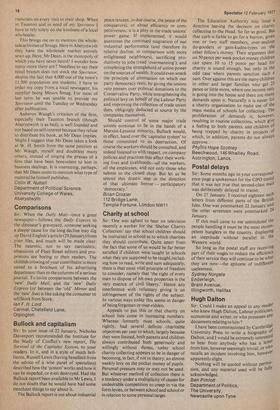Charity at school
Sir: One was aghast to hear on television recently a worker for the 'Shelter Charity Collection' say that school children should be instructed in school as to which charities they should contribute. Quite apart from the fact that some of us would be far better satisfied if children were taught in schools what they are supposed to be taught,including how to read, write and sum adequately, there is that most vital principle of freedom to consider, namely that 'the right of every man to dispose of his own properties is the very essence of civil liberty.' Hence any interference with voluntary giving is an infringement of the rights of the subject. In various ways today this seems in danger of being forgotten or over-ridden.
Appeals to put this or that charity on school lists come in increasing numbers. Whereas formerly most schools, quite rightly, had several definite charitable objectives per year to which, largely because they were limited, both parents and children always contributed both generously and willingly without duress, today school charity collecting appears to be in danger of becoming, in fact, if not in theory, an almost weekly levy on the pocket money of pupils. Personal pressure may or may not be used. But whatever method of collection there is a tendency under a multiplicity of causes for undesirable competition to creep in via the form levies, or between school and school or in relation to some personal target.
The Education Authority may issue a directive leaving the decision on charity collecting to the Head. So far so good. But that curb is liable to go for a burton, given one or two staff members, over-zealous do-gooders or gain-kudos-types on the other fellow's money. Their argument that on 50 pence per week pocket money children can spare 10 to 15 pence per head for charity is sound enough, but only in the odd case where parents sanction such a sum. Over against this are the many children in other and larger families who get 25 pence or little more, where one income only is going into the house and there are manY demands upon it. Naturally it is easier for a charity organisation to make use of the mass media of schools for collecting. The
wever, proliferation of demands is, ho
resulting in routine collections, which give, a feeling to both parents and children of being trapped by charity in projects of which, in addition, parents do not always approve.
Phyllis Hope Scotney Beechwood, 146 Whalley Road, Accrington, Lancs.


































 Previous page
Previous page